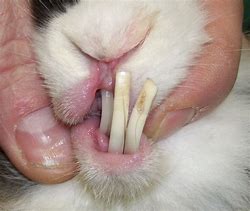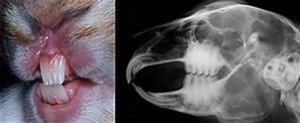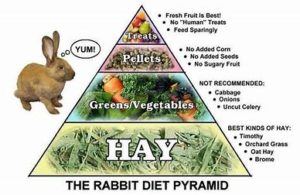
Rabbit Dental Health
Rabbits are cute, cuddly and very unique, especially when it comes to their health. Digestive health and diet are critical in keeping you r rabbit as healthy as possible. And something that impacts this greatly is dental health.
Rabbits have 4 incisor teeth at the front of their mouth, 2 peg teeth behind and 22 molar teeth set back from these with pads of gum in between. The teeth are continuously growing throughout their life and therefore must be worn down through good chewing of proper foods.

Some rabbits are born with improper tooth position which can lead to overgrowth and must be addressed/managed regularly. But bunnies can also develop overgrown teeth through poor diet and chewing options.

So how do you know if your rabbit has healthy teeth? If your rabbit likes to be handled you may be able to view the incisors at the front which should be short with the upper incisors sitting slightly in front of the lower incisors. However, your vet will be able to check both the incisors as well as the cheek teeth (molars) at the 6 monthly check up/vaccination. Symptoms of poor dental health which you may notice at home can include elongated incisors, food/saliva staining around the mouth, dropping food, choosing softer foods and weight loss.
If you have any concerns a check up with a vet is recommended. Elongated incisors can be trimmed, however this is a sign of generalised tooth problems, so it is always best to examine and shorten the back teeth under a general anaesthetic as well. Overgrown back teeth can cause pain and entrapment of the tongue, problems with swallowing and, over time, overgrowth of the roots which can deform the jaw, causing pain and abscesses.
The best way to keep your rabbit’s teeth and gut healthy are to provide a healthy, balanced diet. This broadly consists of 70-80% good quality grass, oaten or meadow hay (available at all times), 10-20% fresh foods especially greens, and <10% formulated pellet diet (2-3 tbsp daily) and treats including fruit. More information about suitable foods is below.

- Veggies/greens – 2 cups per kilogram bodyweight per day of fresh leafy greens such as bok choy, celery tops, broccoli tops, alfalfa sprouts, weeds including dandelions, fresh grass, and parsley. At least 3 different leafy greens should be fed. Avoid very watery greens such as iceberg lettuce and celery which may cause diarrhea.
- Treats include Fruits, carrot, sweet potato, capsicum and other non-leafy vegetables.
- Choose a pellet with high fibre and low protein (both about 16% is ideal).
- No-nos include cereals, grains, seeds, oats, nuts, bread, biscuits, sweet items and chocolate.



